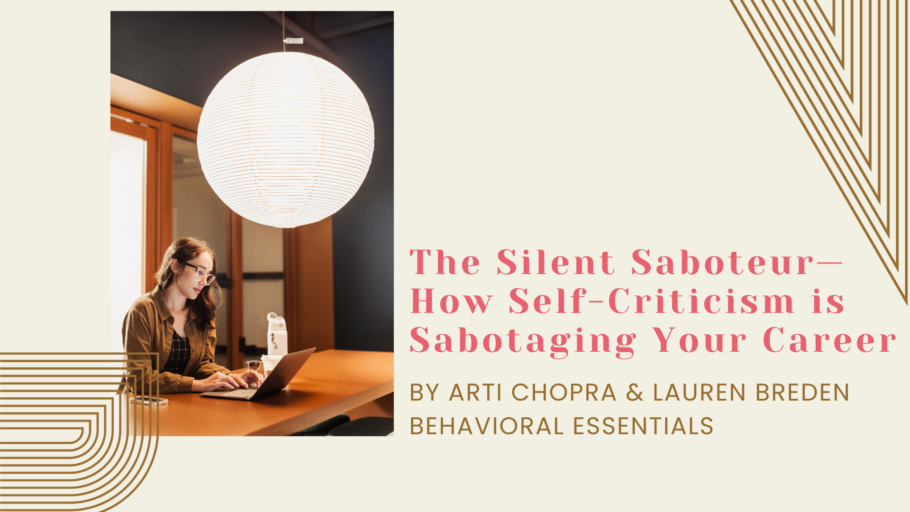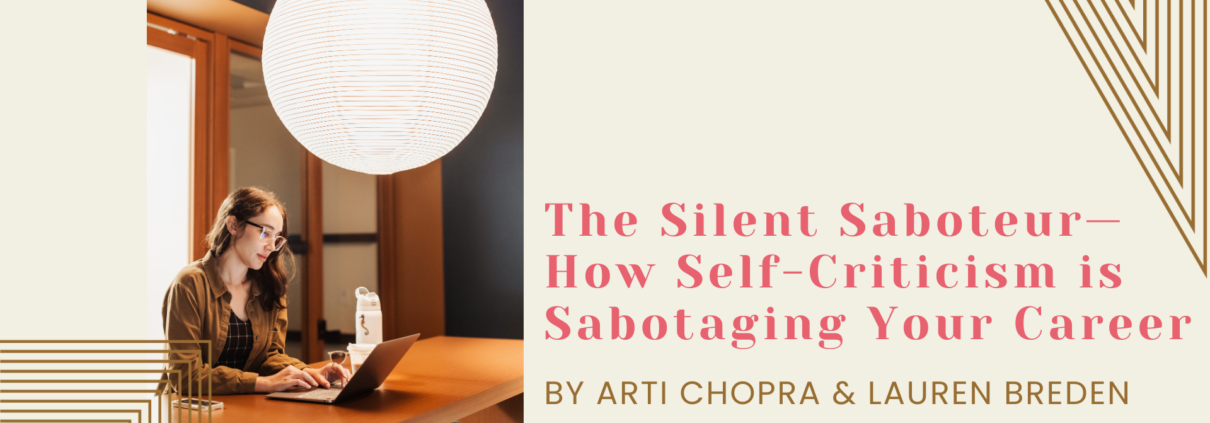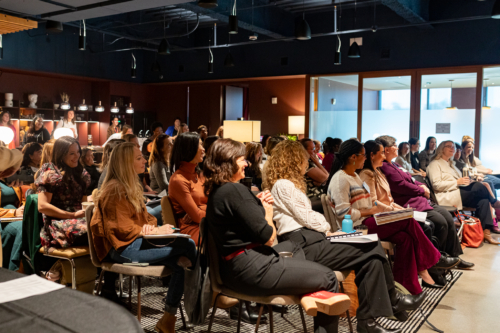The Silent Saboteur: How Self-Criticism is Sabotaging Your Career
Authors: Arti Chopra & Lauren Breden, Behavioral Essentials
Many of us have a little voice in our head. A voice that says:
- “You’re not good enough.”
- “You don’t know enough.”
- “Why would anyone listen to you?”
- “You really should be more assertive—they are walking all over you.”
- “You’re really going to wear that to an interview?”
This voice is always nitpicking, always finding the bad in the good. It critiques our abilities, questions our choices, and crushes our self-worth.
And for high performing women (men too!), this inner critic seems to be the loudest. It can be so loud that it keeps us from pursuing our dreams, taking the leap, starting a business or simply introducing ourselves to someone at a cocktail party. But why is this not-so-silent killer sabotaging so many of us? And most importantly…what can we do about it?
Read on.
Self-Criticism’s Impact
Self-doubt is a universal human emotion. Some of the world’s most successful people have struggled with believing in themselves, despite their achievements, performances and medals to show for it.
But research reveals that a larger percentage of individuals who identify as women, especially in professional and entrepreneurial settings, often wrestle more intensely than their male counterparts with their inner critics:
- A study in the Journal of Personality and Social Psychology highlights that women are more likely than men to engage in self-critical thinking and experience self-doubt in professional contexts. Societal and cultural expectations place higher demands on women’s performance and behavior, contributing to internalized negative self-talk.
- Imposter phenomenon, where individuals doubt their accomplishments and fear being exposed as a “fraud,” is prevalent among high-achieving women. Research from the International Journal of Behavioral Science indicates about 70% of people experience this, with women disproportionately affected.
- Studies by the American Psychological Association show that women often have lower self-esteem compared to men, correlating with higher levels of self-criticism. Societal pressures and gender roles play significant roles, influencing evaluations based on appearance, behavior, and performance.
- Research by the Kauffman Foundation finds that women entrepreneurs frequently report lower self-efficacy than their male counterparts, linked to heightened self-doubt and self-criticism. These factors can hinder risk-taking and growth opportunities in businesses.
- Research in the Harvard Business Review reveals that gender bias in workplaces affects women’s self-perception. They’re more likely to internalize negative feedback, impacting self-worth and fostering self-critical thoughts that hinder career advancement.
Unfortunately, none of this information is new. But the impact it could have on your career might be.
The High-Performance Paradox
Many women struggling with self-criticism share another trait in common—they are high performers. In fact, their self-critical tendencies often drive their success. On one hand, the deep desire to excel fuels meticulous preparation, continuous self-improvement, and a relentless pursuit of excellence. This critical inner voice pushes them to set high standards and strive for perfection, resulting in exceptional achievements.
However, this same mindset can lead to burnout, anxiety, and a paralyzing fear of mistakes. Over time, excessive self-criticism erodes self-esteem and perpetuates feelings of inadequacy, despite outward success. This cycle can lead to missed opportunities and overall dissatisfaction.
This paradox is what makes managing self-criticism so tricky. The very behavior that has likely propelled your success can also be your downfall when you’re not aware of its power.
Self-Evaluation vs. Self-Criticism
“Perfectionism is the voice of the oppressor, the enemy of the people. It will keep you cramped and insane your whole life.” – Anne Lamott
Given this paradox, we know some form of self-reflection and feedback is vital for growth. However, when feedback turns unfriendly and our cheerleader becomes a critical voice, problems arise.
To use our power of self-reflection to propel us, it’s essential to distinguish between helpful self-evaluation and harmful self-criticism.
Healthy self-evaluation fosters self-improvement through thoughtful reflection on skills and performance. In contrast, self-criticism intensifies this evaluation into a harsh scrutiny of perceived weaknesses.
At Behavioral Essentials, we use a behavioral assessment to measure these tendencies through our Self-Critical scale. Individuals with moderate-high or high scores on the Self-Critical scale often engage in harmful self-criticism, leading to lower self-esteem and unsupportive beliefs. This critical mindset can affect relationships, work performance, and business outcomes, posing significant challenges for entrepreneurs.
How Self-Criticism can Sabotage Your Career
“What you think, you become.” – Buddha
In the workplace, high self-criticism can show its face in several ways. For example, excessive negative self-talk can make high self-critical scorers believe they are never prepared enough.
This can turn healthy preparation for a sales pitch or client engagement into a fear-inducing, energy-draining obsession. When the time for the presentation finally arrives, this lack of presence can negatively impact performance, reinforcing negative beliefs about not being good enough. Great.
Believing we’re not prepared, not good enough, or not ready can also make us avoid spontaneous opportunities crucial for business growth. Whether it’s skipping an introduction to a potential client due to an unpolished elevator pitch or avoiding larger opportunities like applying for grants or seed funding, the impact is the same—missed chances for progress. This is the Inner Critic at its worst.
Working with the Inner Critic
“Every experience is a positive experience if I view it as an opportunity for growth and self-mastery.” – Brian Tracy
Becoming aware of your self-critical behaviors is the first step toward overcoming these barriers and achieving sustainable growth.
Here are a few strategies to challenge self-critical thoughts and cultivate a more empowering mindset:
Opposite Thoughts
Out of the 60 to 70,000 thoughts we have every day, estimates suggest 98% of them are the same. This means your inner critic is really a habit– a thought pattern you can get control of.
When negative thoughts and criticism arise, challenge yourself by thinking “Can the opposite also be true? And can I identify times in which it was?” A coach can be an excellent resource to help you identify these events.
Courage List
Write your version of a courage list. When experiencing self-doubt, can you write down 5 times you did something courageous? This can be personal or professional. What did it take for you to gather the courage necessary to do the thing? This will help you recognize the tools and resources you already have available to you, and it’s a great list to keep visible and keep adding to.
Counter Beliefs
With a trusted friend, spouse, or someone you feel emotionally safe with, write down (using pen and paper, not typing) every negative belief you have about yourself. Then, flip the paper over and write down the opposite of each belief. Read the positive affirmations on the opposite side of the paper when you wake up in the morning and before going to bed for 30 days.
Confidence in Compliments
When someone compliments you, just say a simple “thank you” with a smile. No filler words after or pointing out what could be better.
Kindness Collection
It is human nature to remember criticism more than praise. Make a folder somewhere virtually or physically that contains all the kind things that people have said about you. Revisit it often.
Self-Compliments
When was the last time you gave yourself a genuine compliment? Brené Brown wisely advises, “Talk to yourself like you would to someone you love.” It might feel awkward at first, but treating yourself with the same kindness you show others is a powerful step toward silencing self-critical thoughts.
How a BE Coach Can Support You
But what if you need support to make this shift? That’s where a BE Coach can make all the difference. Our expert coaches specialize in helping you break free from self-limiting beliefs, whether it’s enhancing executive presence, boosting confidence, or holding you accountable to your goals. In a safe, virtual environment, coaching accelerates your personal growth by guiding you toward empowering beliefs and habits that can transform both your business and your life.
As Louise Hay reminds us: “You have been criticizing yourself for years, and it hasn’t worked. Try approving of yourself and see what happens.”
Ready to begin your journey?
As part of TARRA’s partnership with Behavioral Essentials, they are offering a special 6 or 12 session coaching program exclusively to TARRA members. With the help of an expert coach and a good look in the mirror, you’ll learn ways to change old behaviors and define new ones. Before you know it, you’ll be addressing your inner critic head on, communicating more effectively, and making calm, admirably awesome decisions in real-time.
Sign Up Today or get in touch with Behavioral Essentials’ Director of Coaching, Arti Chopra, at [email protected] to learn more.





